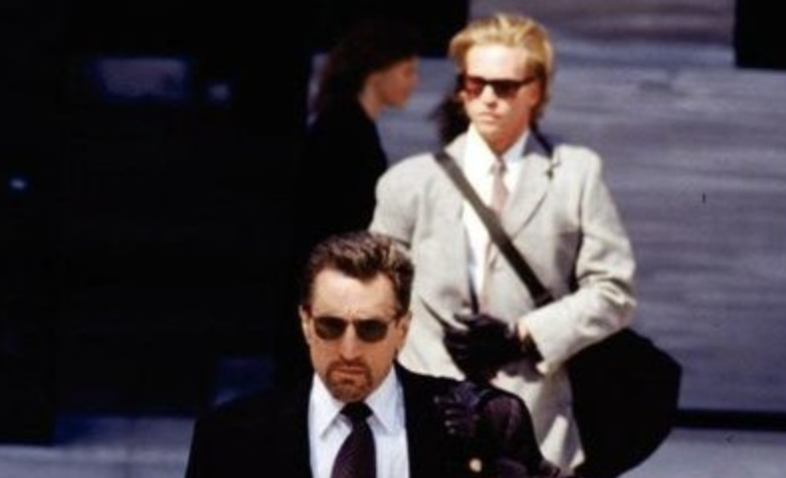
Robert De Niro and Val Kilmer Shine in Michael Mann’s Crime Thriller ‘Heat’
In 1995, director Michael Mann delivered one of the most intense and intricately crafted crime thrillers of all time with the release of “Heat.” This film brought together a stellar cast, including Robert De Niro and Val Kilmer, who delivered powerful performances as two skilled criminals navigating the dangerous world of heists and law enforcement. Their portrayals, along with Mann’s masterful direction, have cemented “Heat” as a classic in the genre.
The Plot
“Heat” centers around Neil McCauley (Robert De Niro), a seasoned thief who leads a crew of expert criminals. McCauley is meticulous, disciplined, and lives by a strict code, which prioritizes the success of his heists and the safety of his team. His right-hand man, Chris Shiherlis (Val Kilmer), is fiercely loyal, bringing a blend of skill and raw intensity to the team. The plot unfolds as McCauley and his crew execute a series of high-stakes heists while being relentlessly pursued by LAPD Lieutenant Vincent Hanna (Al Pacino).
The film delves deep into the personal lives of its characters, exploring themes of loyalty, betrayal, and the heavy toll a life of crime takes on relationships and mental health. The cat-and-mouse game between McCauley and Hanna builds to a climactic showdown, with each character driven by an unyielding sense of duty to their respective roles.
De Niro and Kilmer: A Dynamic Duo
Robert De Niro’s portrayal of Neil McCauley is a masterclass in understated intensity. De Niro imbues McCauley with a quiet, calculated demeanor, making his character’s moments of vulnerability and introspection all the more impactful. His performance is a study in restraint, highlighting the complexities of a man who is both a ruthless criminal and a figure of tragic solitude.
Val Kilmer’s Chris Shiherlis, on the other hand, is a contrasting blend of volatility and loyalty. Kilmer captures the essence of a man torn between his devotion to McCauley’s crew and the disintegration of his personal life, particularly his troubled marriage to Charlene (Ashley Judd). Kilmer’s performance is raw and emotional, providing a perfect counterbalance to De Niro’s controlled precision.
The chemistry between De Niro and Kilmer is palpable, and their interactions bring depth to the narrative. Whether planning a heist or navigating personal dilemmas, their dynamic adds layers to the story, making their characters’ fates all the more compelling.
A Star-Studded Ensemble
While De Niro and Kilmer’s performances are standouts, the film’s ensemble cast also delivers exceptional performances. Al Pacino’s portrayal of Vincent Hanna is electric, characterized by a manic energy and an obsessive drive to bring McCauley to justice. Pacino and De Niro’s scenes together are cinematic gold, showcasing two acting powerhouses at the top of their game.
Supporting roles by Jon Voight, Tom Sizemore, and Ashley Judd further enrich the film. Each character is given significant depth, adding to the intricate web of relationships and conflicts that define “Heat.”
The Legacy of “Heat”
“Heat” is renowned for its intense action sequences, particularly the meticulously staged heist scenes and the climactic shootout in downtown Los Angeles. Mann’s direction, combined with Dante Spinotti’s cinematography, creates a visually stunning and immersive experience. The film’s realistic portrayal of crime and law enforcement has influenced countless films and TV shows in the genre.
Beyond its technical prowess, “Heat” is celebrated for its complex character dynamics and its exploration of existential themes. The film does not merely focus on the heists but delves into the personal and moral struggles of its characters, offering a nuanced perspective on crime and justice.
Conclusion
Robert De Niro and Val Kilmer’s standout performances in “Heat” are central to the film’s enduring appeal. Their ability to bring depth and authenticity to their roles, combined with Michael Mann’s visionary direction, has ensured “Heat” remains a cornerstone of crime cinema. The film’s exploration of loyalty, betrayal, and the consequences of a life of crime resonates as powerfully today as it did upon its release, solidifying its status as a timeless classic.